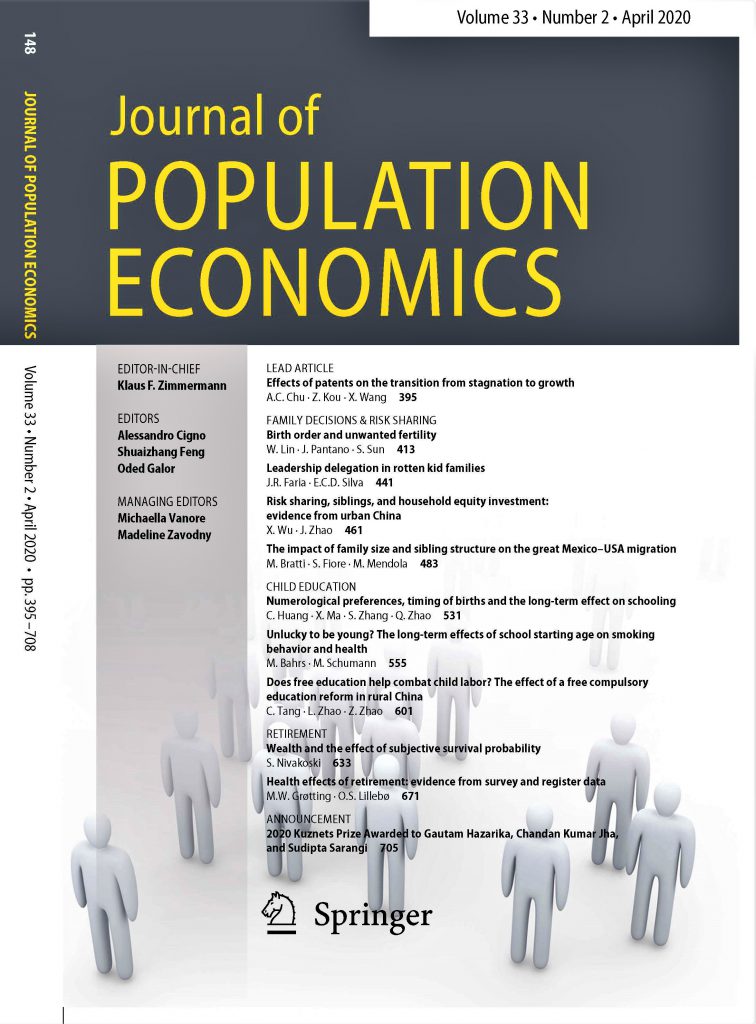The GLO Discussion Paper of the Month of February finds that raising the school leaving age can be effective in reducing the incidence of teenage pregnancy among socially excluded women, even if it does not affect the general population. An important policy implication is the potentially heterogeneous impact of educational interventions across different ethnic groups.
GLO Discussion Papers are research and policy papers of the GLO Network which are widely circulated to encourage discussion. Provided in cooperation with EconStor, a service of the ZBW – Leibniz Information Centre for Economics, GLO Discussion Papers are among others listed in RePEc (see IDEAS, EconPapers). Complete list of all GLO DPs downloadable for free.
GLO Discussion Paper of the Month: February
GLO Discussion Paper No. 474, 2020
Books or babies? The incapacitation effect of schooling on minority women – Download PDF
by Adamecz-Völgyi, Anna & Scharle, Ágota
GLO Fellow Adamecz-Völgyi, Anna
Author Abstract: This
paper examines the effects of an increase in the compulsory school
leaving age on the teenage fertility of Roma women, a disadvantaged
ethnic minority in Hungary. We use a regression discontinuity design
identification strategy and show that the reform decreased the
probability of teenage motherhood among Roma women by 13.4-26.0% and
delayed motherhood by two years. We separate the incapacitation and
human capital effects of education on fertility by exploiting a database
that covers live births, miscarriages, abortions and still births, and
contains information on the time of conception precise to the week. We
find that longer schooling decreases the probability of getting pregnant
during the school year but not during summer and Christmas breaks,
which suggests that the estimated effects are generated mostly through
the incapacitation channel.
GLO Discussion Papers of February 2020
479 Incentive Pay and Firm Productivity: Evidence from China – Download PDF
by Jin, Zhangfeng & Pan, Shiyuan
478 Switching from an inclining to a zero-level unemployment benefit profile: Good for work incentives? – Download PDF
by Cockx, Bart & Declercq, Koen & Dejemeppe, Muriel & Inga, Leda & Van der Linden, Bruno
477 Resilience Strategies for Mismatched Workers: Microeconomic Evidence from Egypt – Download PDF
by Syed Zwick, Hélène
476 Sex Ratio and Global Sodomy Law Reform in the Post-WWII Era – Download PDF
by Chang, Simon
475 The Impact of Air Pollution on Attributable Risks and Economic Costs of Hospitalization for Mental Disorders – Download PDF
by Wu,
Ziting & Chen, Xi & Li, Guoxing & Tian, Lin & Wang,
Zhan & Xiong, Xiuqin & Yang, Chuan & Zhou, Zijun & Pan,
Xiaochuan
474 Books or babies? The incapacitation effect of schooling on minority women – Download PDF
by Adamecz-Völgyi, Anna & Scharle, Ágota
473 Teacher Labor Markets in Developing Countries – Download PDF
by Crawfurd, Lee & Pugatch, Todd
472 Women’s optimism, the gender happiness equaliser: a case of South Africa – Download PDF
by Greyling, Talita & Fisher, Bianca
471 Robots and the origin of their labour-saving impact – Download PDF
by Montobbio, Fabio & Staccioli, Jacopo & Virgillito, Maria Enrica & Vivarelli, Marco
470 Ethnic Attrition, Assimilation, and the Measured Health Outcomes of Mexican Americans – Download PDF
by Antman, Francisca M. & Duncan, Brian & Trejo, Stephen J.
469 Inflated Expectations and Commodity Prices: Evidence from Kazakhstan – Download PDF
by Girard, Victoire & Kudebayeva, Alma & Toews, Gerhard
468 Which Model for Poverty Predictions? – Download PDF
by Verme, Paolo
467 Affirmative Action and Intersectionality at the Top: Evidence from South Africa – Download PDF
by Klasen, Stephan & Minasyan, Anna
466 Innovation Strategies and Productivity Growth in Developing Countries: Evidence from Pakistan – Download PDF
by Wadho, Waqar & Chaudhry, Azam
465 Educational mismatches, technological change and unemployment: evidence from secondary and tertiary educated workers – Download PDF
by Esposito, Piero & Scicchitano, Sergio
464 Reducing the income tax burden for households with children: An assessment of the child tax credit reform in Austria – Download PDF
by Christl, Michael & De Poli, Silvia & Varga, Janos
463 The Retirement Migration Puzzle in China – Download PDF
by Chen, Simiao & Jin, Zhangfeng & Prettner, Klaus
462 Rising longevity, increasing the retirement age, and the consequences for knowledge-based long-run growth – Download PDF
by Kuhn, Michael & Prettner, Klaus
461 Exports and long-run growth: The case of Spain, 1850-2017 – Download PDF
by Bajo-Rubio, Oscar
460 Weathering the storm: Weather shocks and international migrants from the Philippines – Download PDF
by Pajaron, Marjorie C. & Vasquez, Glacer Niño A.
GLO DP Team
Senior
Editors: Matloob Piracha (University of Kent) & GLO; Klaus F.
Zimmermann (UNU-MERIT, Maastricht University and Bonn University).
Managing Editor: Magdalena Ulceluse, University of Groningen. DP@glabor.org

Ends;





